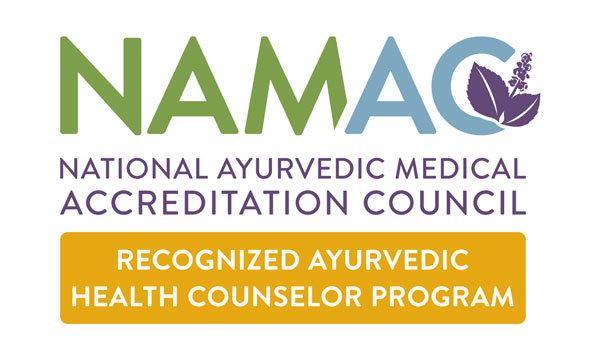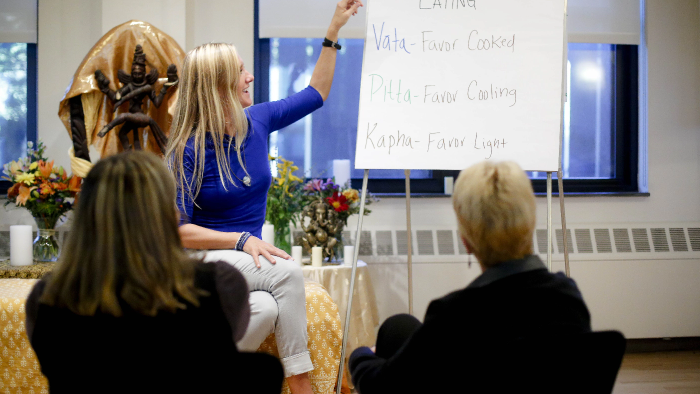650-Hour Ayurvedic Health Counselor Certification
As Ayurveda continues to gain recognition worldwide for its holistic, nature-based approach to health, people are turning to this ancient science to restore balance, manage stress, and improve overall well-being. For two decades, the Kripalu School of Ayurveda (KSA) has been at the forefront of professional Ayurvedic certification, helping individuals connect with the rhythms of nature and the body to promote health, vitality, and happiness.
Through our Ayurvedic Health Counselor Certification program, you will gain the skills to guide clients toward optimal health through Ayurvedic diet and lifestyle practices. This clinical training program is designed to equip you to work directly with clients, applying Ayurvedic principles to help them achieve balance and whole-hearted living.

Information Sessions
Register for one of our free, online information sessions to learn more.
SIGN UP
The 650-hour certification is a two-part journey, starting with the 200-hour Foundations of Ayurveda course. Upon successful completion, you can apply for the 450-hour Clinical Training in Ayurveda, where you’ll learn how to establish a clinical practice and enhance your clients' well-being through individualized Ayurvedic guidance. Graduating from the Foundations of Ayurveda and the 450-hour Clinical Training in Ayurveda will earn you Kripalu certification as a 650-hour Ayurvedic Health Counselor (AHC) and qualify you to sit for NAMA’s national AHC exam.
Embark on a transformative journey that combines ancient Ayurvedic wisdom with modern health practices, empowering you to help others achieve balance, vitality, and lasting well-being.
REQUIRED TEXT AND MATERIALS
In addition to the complimentary manual provided, you'll need the following texts for the program:
- The Everyday Ayurveda Cookbook: A Seasonal Guide to Eating and Living Well, Kate O’Donnell
- The Everyday Ayurveda Guide to Self-Care, Kate O'Donnell
- Ayurveda and the Mind, Dr. David Frawley
- Textbook of Ayurveda, Volume 1: Fundamental Principles of Ayurveda, Dr. Vasant Lad
- Textbook of Ayurveda, Volume 2: A Complete Guide to Clinical Assessment, Dr. Vasant Lad
- Astanga Hrdayam (3-volume set)
- Advanced Pulse Reading eCourse, Dr. John Douillard (Special student rate available after completing Foundations of Ayurveda)
- Pranayama for Restoring Vitality Audio Course, Larissa Carlson (Discount available after course starts)
AYURVEDIC PHYSIOLOGICAL SYSTEMS, CHANNELS, AND TISSUES
Deepen your understanding of Ayurvedic anatomy and physiology, focusing on tissues and channels to enhance your clinical expertise.

OPTIMIZING DIGESTIVE STRENGTH
Learn to assess your clients digestive capacity, create personalized food plans, and support proper digestive function to transform food into sustainable energy for the body and mind.

THE DAILY ROUTINE AS A PREVENTIVE PRACTICE
Lead your clients through the power of aligning daily routines with natural circadian rhythms to foster health, vitality, and emotional well-being.

HEALTH COACHING SKILLS
Receive mentorship and supervised practicum experience, building clinical skills and gaining confidence in conducting Ayurvedic health consultations.

ETIOLOGY AND PATHOLOGY: THE ROOT CAUSES OF DISEASE
Learn to identify and address the root causes of imbalance through Ayurvedic clinical evaluation, enabling you to help clients achieve lasting health.

AYURVEDA HERBOLOGY
Discover the properties, actions, and uses of medicinal herbs within the Ayurvedic system. Create personalized herbal recommendations that support digestive and nervous system health, helping clients achieve balance and well-being through nature's healing remedies.

AYURVEDA AND THE INNER WORKINGS OF THE MIND
Discover how the gunas of the mind influence emotional balance and how to use Ayurveda to nourish mental health and emotional resilience. Understand when to refer clients to mental health specialists.

GUIDING THE CLIENT IN MEDITATION AND PRANAYAMA
Gain insight into how meditation and breathing practices reduce stress and support emotional resilience. Learn accessible techniques to guide your clients in mindfulness and breathwork.
Clinical Training of Ayurveda | HYBRID
September 3, 2025–May 22, 2026
On Campus: November 9–16, 2025, January 9–16, 2026, & May 15–22, 2026
How To Apply
To apply to Foundations of Ayurveda, click here. Once you successfully complete this 200-Hour training, you will apply for the 450-Hour Clinical Training in Ayurveda program by contacting Kripalu Schools at kripaluschools@kripalu.org. With each program acceptance letter, you will be eligible to sign up for that specific training once it's open for registration.
ONLINE TRAININGS
Is the curriculum different for online versus on-campus training?
No, the curriculum is the same for both formats.
What do I need for online training?
To participate in online classes, you'll need:
- A reliable internet connection
- A computer or tablet equipped with a webcam, microphone, and speakers.
- The Zoom app installed.
- Basic word processing capabilities for assignments.
Are online programs live or recorded?
The majority of online classes are taught live, and active participation is expected. Recordings of each session will also be available in an online library to support your study and review.
Are online programs live or delivered asynchronously by recording?
Online programs are taught live and students are expected to be present and participate during Zoom video calls. Recordings of classes for some trainings will also be saved in an online video library for students to review when studying.
HYBRID TRAININGS
How are hybrid trainings conducted?
Hybrid programs combine online and on-campus components. The online portion is delivered live via Zoom, with the same technical requirements as fully online trainings. Please refer to the respective sections of this FAQ for additional details about online and on-campus training.
ON CAMPUS TRAININGS
How should I prepare for on-campus training?
Your time at Kripalu will be immersive and full. To prepare:
- Begin or maintain a gentle yoga practice if you’re not already doing so.
- Adjust your daily routine to align with the training schedule, paying particular attention to wake-up times, mealtimes, and bedtime.
Sample Daily Schedule:
6:30–7:30 am Sadhana (yoga, pranayama, and meditation.)
7:30–8:30 am Silent Breakfast
8:30 am–12:00 pm Program Session
12:00–2:00 pm Lunch
2:00–6:00 pm Program Session
7:00–9:00 pm Occasional Evening Program
You will receive a welcome email a few weeks before the program begins, including required readings, assignments, and other important details.
Will there be time for yoga and other activities?
The schedule is intensive, but you will generally have a midday break from 12:00–2:00 pm and some free evenings to participate in Kripalu’s R&R or evening programs.
Is financial assistance available?
Yes. Kripalu Schools offer scholarships made possible through the generosity of patrons and donors. Financial assistance is awarded based on availability of funds. Click here to learn more about scholarships and eligibility.
What housing options are available?
Kripalu offers a variety of accommodations, from dorm-style rooms with shared baths to private rooms with private baths. Pricing depends on the option chosen, and early registration is recommended as spaces fill quickly. Learn more about accommodations here or call 413.448.3152.
GENERAL INQUIRIES
Are Kripalu School of Ayurveda trainings academically rigorous?
Yes. Ayurveda is a profound and complex system of healing that requires dedicated study and practice. Courses are led by expert faculty and include required readings, assignments, quizzes/exams, and active participation.
What academic support is available?
KSA provides comprehensive academic support, including feedback and mentoring on assignments. Faculty and staff are available for virtual office hours to support students throughout their studies.
Does the program include panchakarma or Ayurvedic massage training?
No. Panchakarma involves specialized detoxification treatments, often associated with Ayurvedic spa services. Offering these treatments typically requires a massage therapy license in most states.
Will there be a graduation ceremony?
There will be a closing event for graduating students; however, this is not a formal graduation and is not open to guests outside of the graduates.